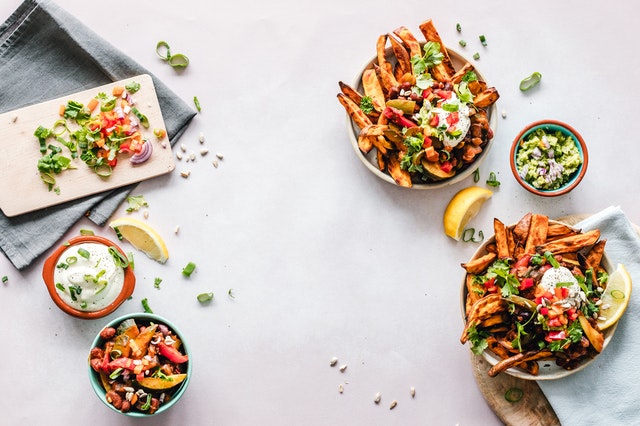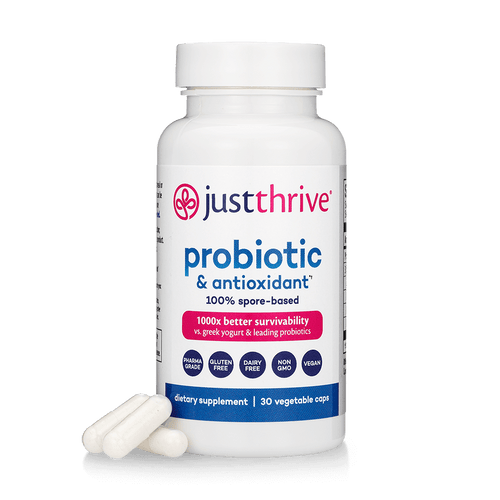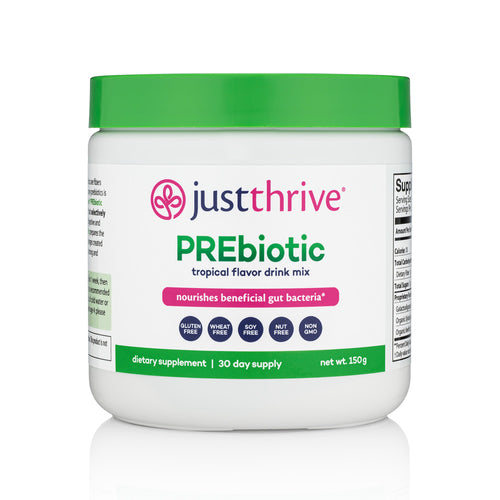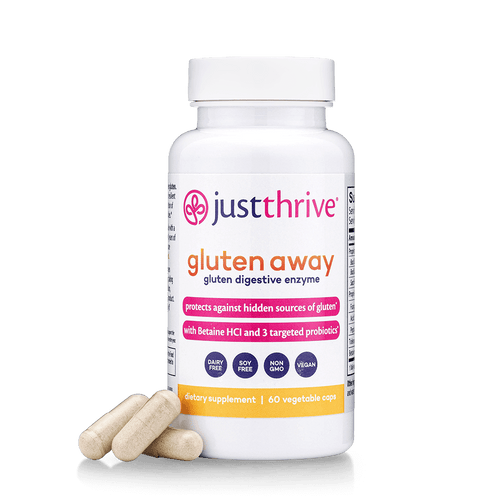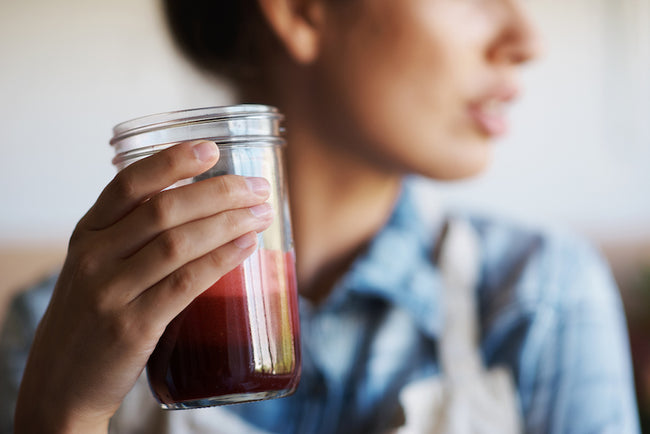Do you feel bloated after eating… and sometimes even between meals?
Do you wake up with a pretty flat stomach, only to end the day with a bowling ball in its place?
That feeling of being uncomfortably full (as opposed to just-right full), needing to unbutton your pants to make room for a painfully swollen stomach, can take all the enjoyment out of eating… and it can set in even if you didn’t overeat.
When that tight, swollen, painful feeling shows up, you might blame it on something you ate. And you could be right – many foods can set off that symptom. But they don’t do it alone.
Bloating starts right where it strikes… in your gut.
And keeping your gut microbiome (the trillions of bacteria in your gut) in healthy balance is the best way to stop bloat before it starts.
The Lowdown on Bloating
If you regularly suffer from a bloated gut, you know how frustrating and painful it can be. It’s more than just an annoyance, like when you can’t fit into the clothes you wanted to wear.
Constant bloating can mess with your self esteem… interfere with your social life… and even make it harder to get through a day of work or school.
That’s why it’s important to tackle the main cause of bloating – bad bacteria in your gut microbiome.
In case you were wondering, water retention is not the same as bloating, even though many people (even doctors) lump them together.
Common Conditions Linked to Bloating
There are several diseases that include bloating among their common symptoms. And, as you might expect, they all affect the digestive system.
Bloating usually shows up in these conditions:
- Irritable bowel syndrome (IBS)
- Inflammatory bowel disease (IBD)
- Celiac disease
- Small intestine bacteria overgrowth (SIBO)
- Chronic constipation
And it makes their already uncomfortable symptom profiles even worse.
But it’s not really surprising that all of these conditions can lead to more bloating. After all, they all affect your gut. And they’re all affected by the kinds of bacteria in your gut microbiome – especially when it’s out of balance.

Some Foods Can Trigger Even More Bloating
Bloating can sometimes come on in connection with specific foods, and some foods are more likely to set it off. That’s especially true if your gut microbiome is imbalanced, a condition called dysbiosis.
Some of the most common bloat-causing food culprits include:
- Fructose, especially in the form of high fructose corn syrup
- Lactose, found in dairy products
- Gluten, a key component of wheat and other grains
- Sugar substitutes such as sorbitol, mannitol, or xylitol
But just as often, you can get bloated even if you haven’t eaten a trigger food. In fact, it might seem like everything you eat makes your gut blow up.
That’s because bloating is a main symptom of dysbiosis. That condition affects how you digest foods, how much gas gets produced, and how quickly that gas moves through your system.
Bad Bacteria Produces Gas
There’s a reason bloat feels like a balloon blowing up in your stomach: Many bacteria – especially bad bacteria – create gases.
Some of those are harmless, but others can change the way your body functions. For example…
Bacteria (known as sulphate-reducing bacteria) munch on sulphur molecules (commonly found in foods like meat and eggs). They convert that into a gas called hydrogen sulphide, which can cause inflammation in your gut.
Another group of bacteria called methanogens produce methane gas. Methane slows down movement in your intestines. That means gas and solid waste (poop) can’t move through as quickly or easily. Then gas gets trapped, and your gut has no choice but to expand. That puts painful pressure on your abdomen… and you feel uncomfortably bloated.
When your gut microbiome is out of balance, and bad bacteria (pathogens) outnumber good bacteria (probiotics), methane and hydrogen gas production increases. That can change the environment in your gut, making it even easier for bad bacteria to grow and multiply… and leave you feeling bloated more often.
Rebalancing your gut microbiome can get those pathogens under control… reduce production of harmful gases… and put a stop to bloating. The key is to make sure that you reboot your gut the right way, so you don’t end up accidentally making the problem even worse.
The Wrong Probiotics or Fiber Can Make Bloating Worse
Two of the most common recommendations to combat bloating are to take probiotics and get more fiber.
Those are good suggestions, but choosing the wrong probiotics or type of fiber can make bloating much worse. That’s why you need to be extra careful when you’re trying to stop the bloating.
The underlying idea is sound: Bloating starts in your gut microbiome, and it’s worse when that’s out of balance. Probiotics and fiber can help rebalance your gut microbiome… but only if you choose the right types, and steer clear of any that increase bloating.
That’s especially true on the fiber front. When you’re looking for fiber to help combat bloating, you want soluble fiber, also known as prebiotics. But you still have to watch out: Some prebiotics – such as oligofructose and inulin, for example – are know to cause gas and bloating, exactly the problem you’re trying to solve.
And while some other probiotics or prebiotics may not make things worse, they simply won’t help with bloating at all, so you’ll still feel uncomfortable after taking them (and you’ll be out a few bucks).
Supplying your gut microbiome with spore probiotics is the best way to conquer dysbiosis and let beneficial bacteria thrive. Feeding those good bacteria with their favorite foods, special types of prebiotics, helps them colonize, flourish, and rebalance your gut.
And when your gut microbiome is in healthy balance, you’ll see and feel the difference.

Spore Probiotics Balance and Soothe Your Gut
Unlike most of the probiotics you’ll see on grocery store shelves, spore probiotics arrive at your gut microbiome alive and ready to work. These special bacteria can survive everything from extreme temperatures to stomach acid to get where they need to go.
Once spore probiotics get to your gut microbiome, they:
- quickly eliminate pathogens
- colonize and establish a probiotic-friendly environment
- support a wide variety of beneficial gut bacteria
- reset and maintain a healthy balance in the gut microbiome
And they don’t stop there…
Specific strains of spore probiotics have been shown in clinical studies to reduce bloating. In one new study, nearly 3,000 children with severe GI distress were given a spore probiotic called Bacillus clausii. And after 7 days of treatment with B. clausii, bloating decreased by 84%.
Another recent study showed that patients with IBS (irritable bowel syndrome) that experienced severe bloating found great relief after taking a spore probiotic called Bacillus coagulans. That spore probiotic helped reduce abdominal pain by at least 50%
And when you pair spore probiotics with special precision prebiotics, your gut will be even happier.
Precision Prebiotic Fiber Comfortably Nourishes Your Gut
When it comes to fiber, you want to make sure you’re getting prebiotic fiber. Precision prebiotics bypass digestion until they get to your gut microbiome. Once there, they specifically nourish only beneficial bacteria – and this special diet keeps them healthy, strong, and multiplying.
Stick with prebiotics that don’t cause any gut distress , such as:
- Galactooligosaccharides (GOS)
- Fructooligosaccharides (FOS)
- Xylooligosaccharides (XOS)
These special prebiotics will keep your gut comfortable. Plus, they’re well known as the favorite food of the most beneficial bacteria in your gut microbiome.
Rebalance Your Gut with Just Thrive Probiotic...
...and Nourish Those Probiotics with Just Thrive Precision Prebiotic!
Just Thrive Probiotic contains four clinically proven strains of powerful spore probiotics, including:
- Bacillus clausii
- Bacillus coagulans
- Bacillus subtilis
- Bacillus indicus
These spore probiotics work together to restore a healthy balance in your gut microbiome.
Just Thrive Precision Prebiotic contains a unique blend of GOS, FOS, and XOS that specifically feeds the good bacteria you want in your microbiome so you can feel comfortable again.
Let your gut feel the difference with Just Thrive Probiotic and Just Thrive Precision Prebiotic. Add the “healthy gut team” to your routine today.
It’s all too easy for your gut’s delicate balance to get disrupted, causing uncomfortable, and at times embarrassing issues like gas, bloating or constipation.
Try Just Thrive Probiotic and Precision PREbiotic today and save up to 25% off






